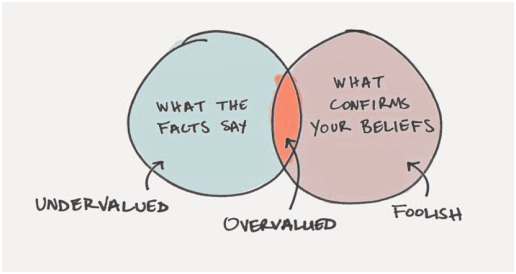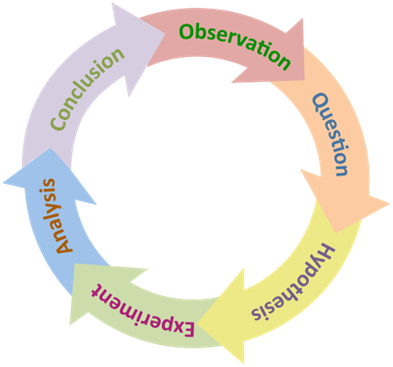The scientific method in investing: Know why proving yourself wrong will always prove you right! [Wednesdays: The Independent Investor]

Miles Everson’s Business Builder Daily speaks to the heart of what great marketers, business leaders, and other professionals need to succeed in advertising, communications, managing their investments, career strategy, and more.
A Note from Miles Everson:
Happy mid-week!
We’re excited to share with you another investing tip.
Every Wednesday, we talk about investing tips, insights, and coaching comments that can help us achieve true financial freedom. These lessons can also apply to our careers, relationships, etc.
Today, let’s go down memory lane and think about the time when we were grade school students.
Continue reading below to know what one of the science fair methodologies can teach you about investing.
Miles Everson
CEO, MBO Partners
Chairman of the Advisory Board, The I Institute
The Independent Investor
Are you familiar with the confirmation bias?
This is a phrase coined by English psychologist Peter Wason and refers to our tendency to favor information that confirms or strengthens our beliefs or values, and ignore contrary information.
Confirmation bias is one of the effects of information processing. It is the result of automatic, unintentional strategies rather than deliberate deception. Unfortunately, this type of bias cannot be avoided or eliminated; it can only be managed by improving our critical thinking skills.

Photo from Simply Psychology
What Your Grade School Science Fair Can Teach You About Life and Investing
According to Professor Joel Litman, Chairman and CEO of Valens Research and Chief Investment Strategist of Altimetry Financial Research, the typical first step in answering a question is to start looking for more information. The thing is, that’s also where we often run into trouble.
Why?
It’s natural to seek out data that supports our hypothesis. After all, it’s a nice feeling whenever we prove ourselves right… but this is where confirmation bias comes into play.
Professor Litman says this type of bias is a tricky phenomenon. It’s a surefire way to “lose our shirts in the market.”
So, what can we do to overcome this bias and answer our questions—whether about life or investing—correctly and properly?
Apply the SCIENTIFIC METHOD.

Photo from Wikimedia Commons
The scientific method has been a mainstay of early education for many decades now. This system is widely considered as a way to objectively take in new information, and is composed of 5 basic steps:
- Make an observation.
- Ask a question.
- Form a hypothesis.
- Test the hypothesis.
- Analyze the data and draw a conclusion.
Professor Litman says the scientific method can be used for almost everything—from elementary school science fairs to PhD-level research. In fact, this is also a useful tool in disciplined investing!
Using the Scientific Method Properly… In Investing
Confirmation bias comes into play in step 4 of the scientific method. This is because if you only look at your side of the problem, you’ll be misguided in testing your hypothesis.
That’s why to use the scientific method properly, you have to try to “prove yourself wrong.”
In the 1930s, Austrian-British philosopher Karl Popper argued that proving an affirmative theory simply wasn’t enough. To be truly objective in your work or whatever you’re doing, you have to play “devil’s advocate” with your own beliefs.
Let’s apply that concept in the world of investing…
According to Professor Litman, most of the mainstream financial media doesn’t make that effort; neither do poorly disciplined investors.
Think about the idea that we’re currently on the edge of a recession as an example. Many talking heads are certain that the world is going to shambles, that the markets are entering a massive bear market, and that we’re in a recessionary pullback.
It’s easy to say such things given that there’s plenty of data to back it up (assuming that’s all we look for). So, once the media comes up with the hypotheses above, it’s also easy to justify them.
Here’s the thing: These are not all the available data about the markets. In fact, they’re just one side of the equation—the side that supports claims that we’re on the edge of a recession.
You’ll see that the so-called “experts” are ignoring plenty of positive market signals just to “prove themselves right.” They’re only interested in data that backs up their recession theory.
That’s the problem and the root of poor investment decisions.
At Altimetry Financial Research, Professor Litman says he and his team play “devil’s advocate” with one another as part of their standard operating procedure (SOP).
Once they have a good stock idea they want to pitch, they assign someone from the team to represent the opposing side, and that person would purposefully raise everything that could go wrong with their stock idea.
If the opposition makes such a strong case that makes them think twice about their analysis, that means they have to do more research on a particular stock or pass on it.
—
Professor Litman says in reality, when the market moves against you, it’s almost always because of an error in your approach… and when you lose money, it’s likely because you failed to apply the scientific method properly in your investment research.
You sought data only to confirm your feelings, rather than to confirm the truth.
Think about those times when you got angry. When you’re mad, you tend to find reasons to back up your anger. Even the smallest detail can seem like a gigantic issue if you’re determined to justify why you’re mad.
When you do this, you’re following the same confirmation bias that can put your investments at risk.
The lesson?
Always look at the two sides of the equation, whether in researching the stock market or anything else! It’s not objectivity if you only look at one side—your side—of the situation and claim it as the absolute truth.
Besides, the stock market doesn’t care about your emotions nor your undisciplined research. No amount of conviction can make your wrong ideas right simply because you want them to be.
Keep these insights in mind and apply them to your personal life, investments, and career!
Always remember that it doesn’t hurt to challenge yourself and play “devil’s advocate” with your own beliefs. In fact, proving yourself wrong is what will truly prove you right.
We hope you learned a lot from today’s topic!
(This article is from The Business Builder Daily, a newsletter by The I Institute in collaboration with MBO Partners.)
About The Dynamic Marketing Communiqué’s
“Wednesdays: The Independent Investor”
To best understand a firm, it makes sense to know its underlying earning power.
In two of the greatest books ever written on investing, the “Intelligent Investor” by Benjamin Graham and “Security Analysis” by David Dodd and Benjamin Graham (yes, Graham authored both of these books), the term “earning power” is mentioned hundreds of times.
LITERALLY.
Despite that, it’s surprising how earning power is mentioned seldomly in literature on business strategy. If the goal of a business is wealth creation, then the performance metrics must include the earning power concept.
Every Wednesday, we’ll publish investing tips and insights in accordance with the practices of some of the world’s greatest investors.
We make certain that these articles help you identify and separate the best companies from the worst, and develop your investing prowess in the long run.
Our goal?
To help you get on that path towards the greatest value creation in investing.
Hope you’ve found this week’s insights interesting and helpful.
Stay tuned for next Wednesday’s “The Independent Investor!”
Cheers,
Kyle Yu
Head of Marketing
Valens Dynamic Marketing Capabilities
Powered by Valens Research
www.valens-research.com




